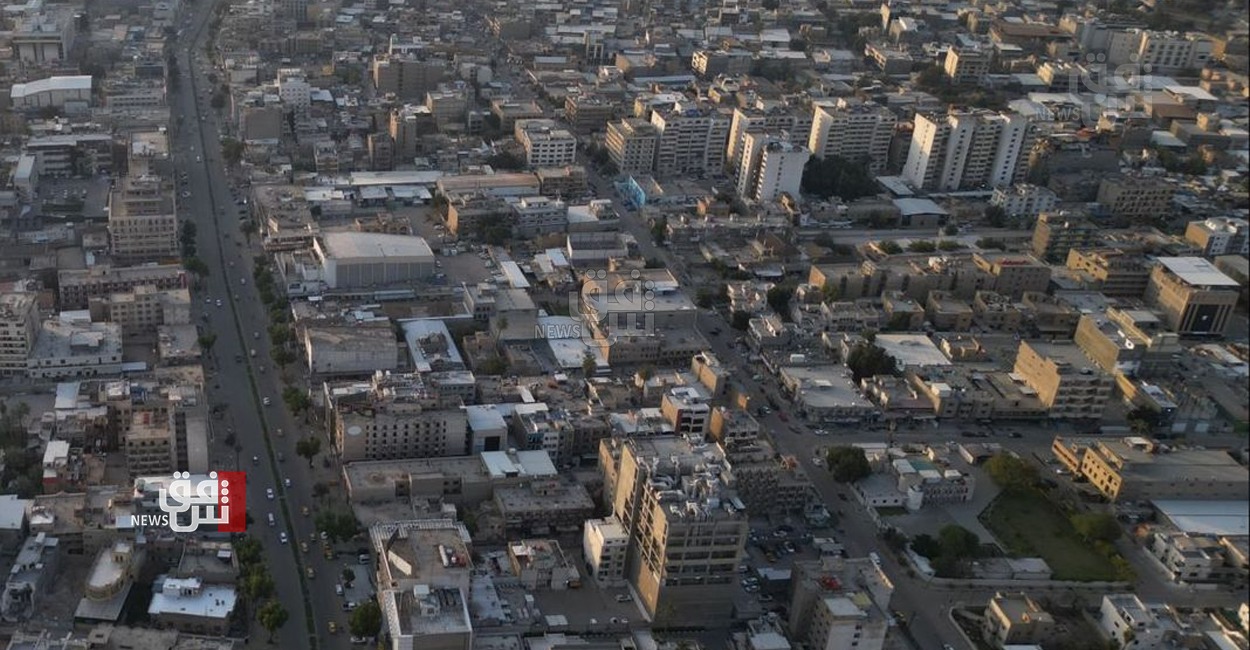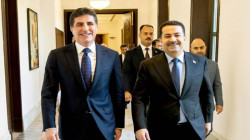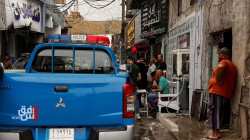Al-Battawin: Baghdad's ancient heart submerged in crime's underworld

Shafaq News / In the heart of Baghdad lies Al-Battawin, a district veiled in a shroud of desolation and decay.
Encircled by an impenetrable security perimeter, its streets echo with the eerie silence of a city gripped by the shadowy underworld of criminality.
Here, amid the ancient thoroughfares, a recent security endeavor has unveiled the extent of lawlessness lurking within its depths. As security forces maneuver through its labyrinthine passages, apprehending scores of suspects, the operation stands as a somber testament to the pervasive grip of organized crime.
Baghdad's Ancient Heart
Nestled amid the historic expanse of Baghdad lies Al-Battawin, a mere stone's throw from the Monument of Freedom, between the renowned Abu Nuwas Street and the western banks of the Tigris River.
Bounded by Tahrir Square to the north and the bustling district of Al-Karrada to the south, it encompasses a tapestry of iconic cinemas, hotels, commercial establishments, and corporate giants of varied stripes.
Once emblematic of the diverse coexistence of Iraq's populace, Al-Battawin was home to Jews, Christians, Muslims, and Kurds. However, its original residents began to migrate en masse in the early 1990s as the siege on Iraq took its toll, leaving the area primarily inhabited by young migrants from other governorates in search of employment, with only remnants of its original population remaining.
Subject to the strict oversight of Baghdad Municipality, the area's buildings are barred from construction, renovation, or sale due to its heritage status, with most of its streets characterized by dilapidated structures.
These buildings, resulting from the exodus of its residents, have become abandoned shells, overrun with refuse, and permeated by foul odors. The scene suggests that living in this area is nearly untenable, fostering its gradual transformation into a microcosm ruled by illicit traders.
As for the origin of the name "Al-Battawin" is derived from the word "Al-Bata," a village near the city of Hilla, whose inhabitants abandoned it to settle in Baghdad. Thus, the area came to be known as Al-Battawin, in reference to the people of Al-Bata who inhabited it and cultivated its lands.
Shadows of Al-Battawin
Shafaq News Agency's correspondent previously delved into this area, where dozens of stories surfaced about drug cartels, organized crime, human trafficking, prostitution, begging, and other suspicious activities.
It seemed as if it were a city beyond the reach of authority, a sentiment echoed by its residents, who recounted harrowing tales from their lived experiences. Additionally, a security source disclosed the influence of syndicates dictating the security situation and their dealings with security leaders, highlighting the partisan protection of rampant corruption, particularly within two or three streets of this neighborhood.
Building upon these revelations, retired security and strategic expert Brigadier Aqeel Al-Taie attributed the primary catalyst for Al-Battawin operation to "intelligence reports received by security agencies indicating the presence of large quantities of drugs set to be transported out of the area in the coming days." This coincided with the circulation of a video depicting a young man self-harming with a glass tube and consuming a substantial amount of narcotics.
Al-Taie, speaking to Shafaq News Agency, emphasized that "as a result, security agencies decided to execute the operation after the situation spiraled out of control, especially as the drug-addicted youth threatened to break into homes and harm anyone in sight."
He further stated that "the operation's execution took even the area's entrenched powers by surprise; they were unaware of any security operation until the Minister of Interior entered the area, directing the commencement of the operation. Al-Battawin had become a haven for kidnapping gangs, drug traffickers, prostitution rings, and human organ traffickers, as well as a gathering point for beggars."
He added that "foreign nationals flock to this area due to the lack of scrutiny regarding residency or visas, making hotels and accommodations available to them for a fee," continuing, "This area harbors underground chambers and hidden spaces, some of which are used as offices for prostitution or human trafficking, while others serve as workshops for manufacturing and selling various drugs."
According to Al-Taie, the area differs markedly from others in its accessibility to alcoholic beverages, even during religious occasions when liquor stores are closed. It offers drugs, party venues, and brothels, catering to all illicit desires, including for" homosexual individuals, who find solace and commerce within its confines, making it their preferred hideaway."
He concluded by noting that "security elements in Al-Battawin collaborate with owners of liquor stores, aware of who is wanted and who deals drugs, allowing them to operate in exchange for nominal sums."
Crackdown on Crime Capital
Al-Battawin is considered a haven for kidnapping gangs, drug trafficking, prostitution, and human organ trafficking, according to a high-ranking officer who spoke to Shafaq News Agency. "The area contains underground chambers and hidden spots. Some of these locations are used as offices for prostitution or human organ trafficking, while others serve as workshops for manufacturing and selling various types of drugs," the officer noted.
He pointed out that "senior security leadership ordered the operation to be carried out at dawn, suddenly and without prior notice to the local forces. Over 435 suspects were arrested, with charges ranging from drug use and trafficking by foreign nationals violating residency conditions to others involved in human organ trafficking and prostitution."
"Security forces also seized fake offices involved in smuggling individuals out of Iraq by issuing forged visas to those intending to leave the country. Additionally, they uncovered offices engaged in trading counterfeit currency, as well as apartments housing minor girls who are forcibly trafficked. Those who refuse are killed, and their organs are put up for sale."
The source affirmed that "recently issued directives include installing thermal cameras in the area. After the security campaign concludes, efforts will be directed towards revitalizing the area."
Moreover, retired Brigadier General Emad Alou, an expert in security affairs, attributed the transformation of Al-Battawin into a crime hub to "social factors and the presence of various non-Iraqi nationals, as well as the difficulty and irregularity of internal transportation routes. All of these contribute to a social environment conducive to the spread of crime."
Alou warned of the possibility of criminal hotspots returning to Al-Battawin after the ongoing security operation concludes. "Unless checkpoints and stringent security measures are established to monitor the spread of these hotspots, track individuals entering and leaving the area, and monitor the social environment to prevent its return as a crime incubator."
He added, "Measures should also be taken to regulate traffic within this strategic area, which is bustling with various commercial activities, attracting criminal organizations."
Crime infested streets
Several residents of Al-Battawin asserted to Shafaq News Agency that "the first three streets of Al-Battawin, particularly the beginning of Al-Saadoun Street, are among the most dangerous places in Baghdad, where drug trafficking gangs and human organ trade are rampant."
They elaborate that many foreign nationals have made these areas their hideouts, engaging in activities such as begging, prostitution, and other suspicious endeavors.
These residents clarified that "certain women who engage in the promotion of prostitution operate in specific houses within the area, while cafes contribute to the spread of drugs," pointing out that "those implicated in these activities, even if arrested in previous separate security campaigns, are released after a period and return to resume their activities once again."
Reviving Al-Battawin
On his part, Mohammed Al-Rubaie, the Director General of the Public Relations and Media Department at the Baghdad Municipality, clarified that "the Al-Battawin service campaign involves more than 100 supporting vehicles, in addition to the efforts of the Rusafa Municipality, with the support of eight municipal departments and the participation of 500 workers for each morning and evening shift."
Al-Rubaie explained that Al-Battawin campaign focuses on departments such as cleanliness, roads, agriculture, sewage, and water, aiming to adapt them appropriately to the area and its historical significance.
In turn, Dr. Ali Al-Azirjawi, the head of the State of Law Coalition bloc in the Baghdad Provincial Council, affirmed that "the responsibility for this area lies within Baghdad's Municipality. However, as Baghdad Provincial Council, we monitor the municipality's work, and in the coming days, we will conduct an inspection tour to ensure that work is proceeding smoothly to present this area in the best light."
Al-Azirjawi added, "Al-Battawin is considered the heart of the capital and the first sight for visitors to Baghdad. Therefore, while we support the security forces in maintaining security in this vital area, providing intensive services is essential."

